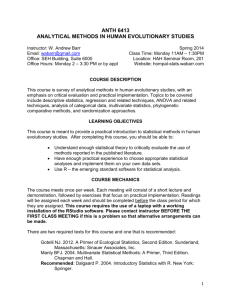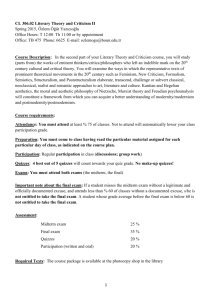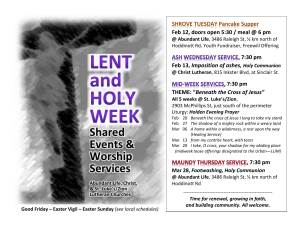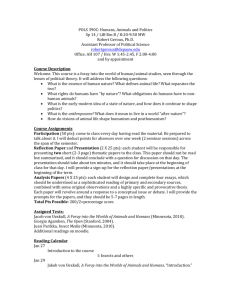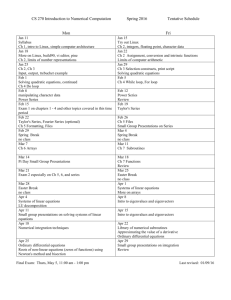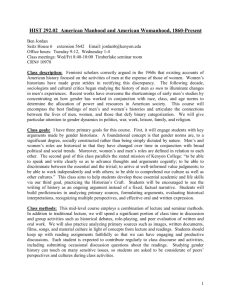ENGL 183G syllabus - University of Massachusetts Boston
advertisement
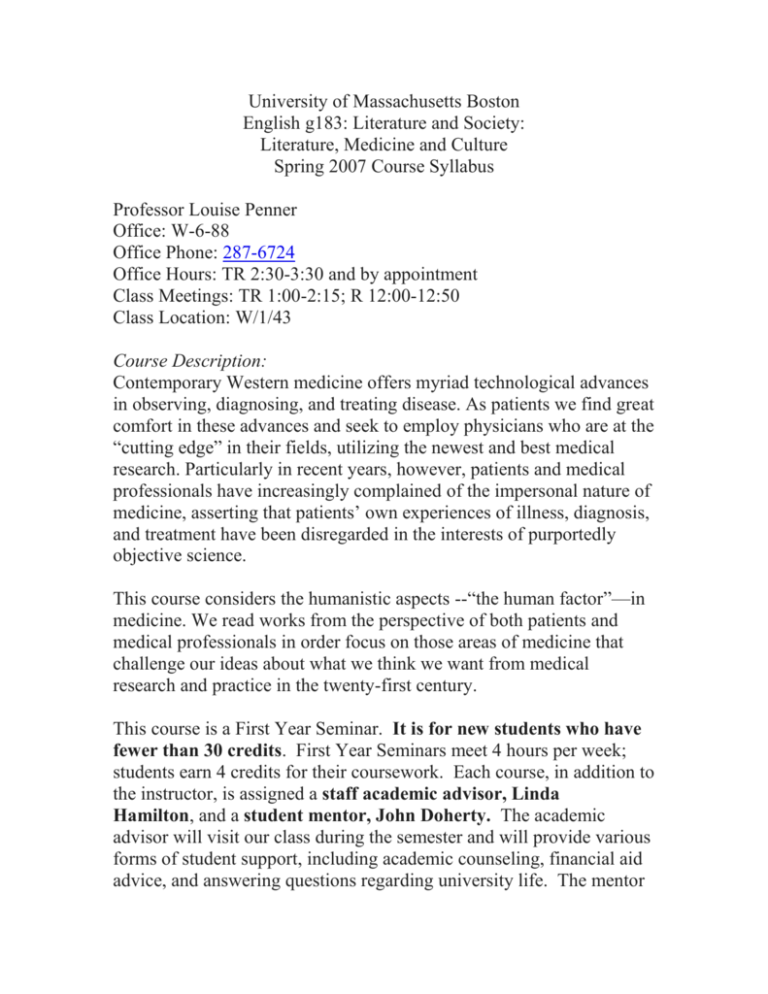
University of Massachusetts Boston English g183: Literature and Society: Literature, Medicine and Culture Spring 2007 Course Syllabus Professor Louise Penner Office: W-6-88 Office Phone: 287-6724 Office Hours: TR 2:30-3:30 and by appointment Class Meetings: TR 1:00-2:15; R 12:00-12:50 Class Location: W/1/43 Course Description: Contemporary Western medicine offers myriad technological advances in observing, diagnosing, and treating disease. As patients we find great comfort in these advances and seek to employ physicians who are at the “cutting edge” in their fields, utilizing the newest and best medical research. Particularly in recent years, however, patients and medical professionals have increasingly complained of the impersonal nature of medicine, asserting that patients’ own experiences of illness, diagnosis, and treatment have been disregarded in the interests of purportedly objective science. This course considers the humanistic aspects --“the human factor”—in medicine. We read works from the perspective of both patients and medical professionals in order focus on those areas of medicine that challenge our ideas about what we think we want from medical research and practice in the twenty-first century. This course is a First Year Seminar. It is for new students who have fewer than 30 credits. First Year Seminars meet 4 hours per week; students earn 4 credits for their coursework. Each course, in addition to the instructor, is assigned a staff academic advisor, Linda Hamilton, and a student mentor, John Doherty. The academic advisor will visit our class during the semester and will provide various forms of student support, including academic counseling, financial aid advice, and answering questions regarding university life. The mentor is an upper-level undergraduate who can assist with computer accounts, e-mail, and library research in addition to serving as a peer counselor. You should also feel free to discuss concerns related to your undergraduate experience with your mentor. Required Texts: Jean Dominique-Bauby The Diving Bell and the Butterfly Margaret Edson, Wit Ann Fadiman, The Spirit Catches You and You Fall Down Atul Gawande, Complications Abraham Verghese, My Own Country Course packet of articles and book chapters on electronic reserve Important details: **You will need to have a library barcode to access the e-reserve materials** **Our e-reserve password is: doctor** **You will need to have an active U Mass email account that you can access frequently since I will be asking you to email and print copies of select assignments to distribute to all of the seminar participants.** **The course syllabus, assignments, and contact information will be available on our course website. Details will follow. Course Objectives: [The objectives of this course are fundamentally tied to the further development of seven skills crucial for academic success: careful reading; (clear) writing; critical thinking; working with computers (information technology/information literacy); engaging in team work; effective listening and oral presentation; providing thoughtful selfassessment or self-evaluation.] 1. To allow students to examine the interdisciplinary field of medical humanities. By reading these works of literature, medicine, philosophy, medical anthropology, and medical sociology, we will begin to understand the importance of the “human factor” in medical research and practice. We will see how individual and collective personalities, preferences, and biases influence the way medicine has been practiced in the past and will be practiced in the future. 2. To permit students to read and appreciate important works of research, reflection, and artistic expression, analyzing how they are constructed as texts and placing them within a specific historical and cultural context. In this manner, we will relate scientific and medical discussions and discoveries to contemporary societal needs and political concerns. 3. To help students improve their writing skills through investigation and analysis. Students will be expected not only to use primary sources, here various nonfiction writings and literary texts, but also secondary sources, in the form of scholarly research. Students, through class discussion, short response papers, oral presentations, and essays, will be encouraged to create their own unique approaches to examining and interpreting the above selection. Through selfassessment, students will improve their analytical abilities. 4. To offer students the opportunity to present and explore their ideas in a public forum. By participating in small group and large group discussions and by offering short presentations, students will be able to articulate and share ideas, as well as respectfully challenge others, thus maturing as thinkers and improving their public speaking skills. 5. By actively engaging with computer systems, using the internet and assorted databases, students will build on technological knowledge and skills. Course Mechanics: • Attendance and punctuality are required. More than four absences will result in your grade being lowered. After six absences a student may fail the class. • Class participation is a must. It improves the quality of discussion (and is graded for both content and frequency). • Late work other than papers: Work that is late can be hand delivered within a week of the due date. It will be marked down 1/2 letter grade. • No late essays will be accepted without the student having obtained prior permission from me unless extreme circumstances can be demonstrated. • All essays must be typed. Each should be double-spaced and have a one-inch margin. Please use a standard font, such as Times New Roman, 12 pt and use MLA Bibliographic documentation. Remember to title your essays and include page numbers and a Works Cited page. Also include your name, course title (and number), as well as the date the assignment is due. Staple all pages together. • Plagiarism, the uncredited use of another’s words, research, and thoughts, is forbidden. If it is suspected, a consultation with materials (that you will be asked to provide) will be required. The first time either cheating or plagiarism is proven, the student receives an F for the assignment. After the second occurrence, he or she is dismissed from the course. Please document your sources appropriately. • If you have a disability and feel you will need accommodations in order to complete course requirements, please let me know and contact the Ross Center for Disability Services (M-1-401) at (617)287-7430. • You are responsible for collecting any materials or assignments handed out during an absence. • You will be expected to open an e-mail account. The university provides this free of charge. In order to sign up, go to room 41 in Healey Library (located on the Upper Level). Course Requirements Attendance and participation 10% Class presentations (and self-assessment) 10% Short (ungraded) response papers and (graded) quizzes 10% Essay #1 15% Essay #2 25% Essay #3 30% Reading Schedule WEEK 1 Introductions to the course and each other T Jan 30 Course Introduction: R Feb 1 Discussion William Carlos Williams, “The Use of Force” (Class Handout) and diagnostic essay Part One: Examining Medical Narrative WEEK 2 M Feb 5 Add/Drop Ends T Feb 6 D.A. Miller, “Narrative” (on e-reserve) Atul Gawande: Complications: Introduction (3-8) and “Education of a Knife” (11-34) R Feb 8 Library instruction WEEK 3 T Feb. 13 Gawande: “The Computer and the Hernia Factory” “When Doctors Make Mistakes” “Nine Thousand Surgeons” “When Good Doctors Go Bad” R Feb 15 Gawande: Complications: Part II: Mystery Begin Presentations WEEK 4 M Feb 19 Presidents Day T Feb 20 Gawande: Complications Part III: Uncertainty Continue Presentations R Feb 22 Continue Presentations Jean-Dominique Bauby, The Diving Bell and the Butterfly WEEK 5 T Feb 27 Video: Bill Moyers, Healing and the Mind R Mar 1 Bauby, The Diving Bell and the Butterfly/ Paper #1 Due for Peer Review Part Two: Culture and Medicine WEEK 6 T Mar 6 Anne Fadiman, The Spirit Catches You and You Fall Down R Mar 8 Fadiman, The Spirit Catches You and You Fall Down WEEK 7 T Mar 13 Fadiman, The Spirit Catches You and You Fall Down/ Revision Paper 1 due R Mar 15 Fadiman, The Spirit Catches You and You Fall Down T Mar 20 Spring Break! R Mar 22 Have fun! WEEK 8 T Mar 27 Fadiman, The Spirit Catches You and You Fall Down R Mar 29 Janelle S. Taylor, “Confronting Culture in Medicine’s “Culture of No Culture’” and “The Story Catches You and You Fall Down” WEEK 9 T. Apr 3 Abraham Verghese, My Own Country R Apr 5 Verghese, My Own Country WEEK 10 T Apr 10 Verghese, My Own Country R Apr 12 Rajini Srikanth, “Abraham Verghese Doctors Autobiography in His Own Country” from Asian American Literature: Form, Confrontation, and Transformation (On e-reserve). Paper #2 Due for Peer Review Part Three: The Ethics of Medical Stories WEEK 11 T Apr 17 John Kelly, “Romy’s Knee” (course reserve) R Apr 19 Kelly, “Romy’s Knee” Course withdrawal and pass/fail deadline WEEK 12 T Apr. 24 Kelly and John Locke, and Sanford Leikin (on ereserve)/ Revision Paper 2 Due R Apr 26 Margaret Edson, Wit WEEK 13 T May 1 Edson, Wit R May 3 Edson, Wit Part Four: Final paper workshopping WEEK 14 T May 8 Student-led discussions of research texts/ Workshop final essays R May 10 Student-led discussions of research texts/ Workshop final essays WEEK 15 T May 15 Student-led discussions of research texts/ Workshop final essays R May 17 Paper #3 Due for Peer Review WEEK 16 T May 22 Wrap up party, evaluations M May 28 Revision, Paper #3 Due: 12:00 p.m. My mailbox in the English Department Offce: 6th floor Wheatley hall


